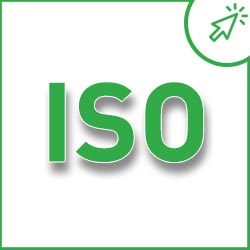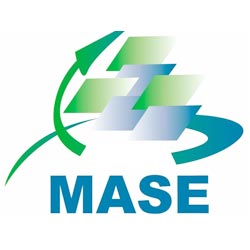Accreditations
an essential quality issue
Certifications such as ISO 9001 provide professionals with a comprehensive framework for implementing risk management strategies, fostering a culture of informed decision-making. The Association of African Inspectors (AAI) also plays a key role in promoting standardized training and certification programs for inspectors, ensuring that they have the skills required to meet the challenges specific to each region. By maintaining stringent accreditation requirements and promoting risk management certifications, Africa continues to improve the quality of inspections and enhance safety, reliability and compliance in its booming industries.
Our accreditations

ISO 9001

ISO 9001
What is it?
Improving customer satisfaction through a quality management system
ISO 9001 is an international standard that aims to implement a quality management system in companies and organisations of all sizes, and in all sectors of activity, with the objective of improving customer satisfaction.
Increasing your performance and competitiveness, satisfying your customers, involving your employees, and being part of a long-term quality approach: these are the main benefits of the ISO 9001 standard for which Apave Tunisie certifies you.
The requirements
- - Management involvement
- - Customer orientation
- - Staff involvement
- - The process approach
- - The system approach
- - A continuous improvement approach
- - Fact-based decision making
- - Mutually beneficial relationships with suppliers
Target
ISO 9001 certification is aimed at any public or private organisation, whatever its size or sector of activity.
The benefits of ISO 9001: Quality Management
- - Increased customer confidence in meeting their needs and expectations
- - Cost reduction
- - Involvement and motivation of staff
- - Progress through a continuous improvement process
- - Removal of trade barriers
- - International recognition
Countries concerned:
Angola - Burkina Faso - Cameroon - Equatorial Guinea - Ghana - Ivory Coast - Madagascar - Mali - Maroc - Mauritius - Senegal - Tunisia

ISO 14001

ISO 14001
What is it?
ISO 14001 is a voluntary international standard for implementing an Environmental Management System in companies and organisations of all sizes and in all sectors of activity. Putting the environment at the heart of your action and being able to prove your impact and its evolution is the challenge of implementing an environmental management system.
The requirements
- - Determine your environmental impact
- - Develop an environmental policy
- - Setting objectives
- - Take regulatory requirements into account
- - Establish processes that respect expressed commitments
- - Take action to improve environmental performance
Benefits of ISO 14001: Environmental Management
- - Identify and control the environmental aspects of its activities, products and services
- - Implement a genuine environmental policy
- - Compliance with regulatory requirements
- - Transparent communication with employees, local residents, customers, environmental associations, elected representatives, insurers, etc.
- - Open up new markets by demonstrating its commitment to preserving and protecting the environment on a global scale.
Countries concerned :
Cameroon - Equatorial Guinea - Ghana - Ivory Coast - Senegal - Tunisia

ISO 17020

ISO 17020
What is it?
ISO 17020 is an international standard for inspection bodies. It establishes criteria and requirements for the competence, impartiality and effectiveness of inspection bodies, whether operating in the public or private sector. ISO 17020 aims to ensure that inspections are carried out professionally, reliably and in accordance with international standards.Requirements:
- - A commitment to the quality and integrity of its inspection activities.
- - Compliance with national and international regulations.
- - A culture of continuous improvement, ensuring a constantly evolving and improving inspection process.
- - Accurate and unbiased inspection results.
Benefits:
- - Provide high-quality inspections: The main objective is to ensure that inspections are carried out competently, impartially and in compliance with standards.
- - Reduce risk: By identifying and mitigating potential risks during inspections, ISO 17020 helps prevent future problems and disputes.
- - Optimizing processes: The efficiency of inspection processes is enhanced by an approach based on international standards.
Countries concerned:
Cameroon - Equatorial Guinea - Ghana - Ivory Coast - Senegal - Tunisia - Mauritius

ISO 45001

ISO 45001
What is it?
ISO 45001 is the first international standard for occupational health and safety management systems (OHSMS). ISO 45001 provides organizations with a structured approach to improving the health and safety of their workers, preventing occupational accidents and illnesses, and reducing the risk of exposure to occupational risk factors.
The requirements
- - The ISO 45001 standard certifies that your company has a quality, safety and environment (QSE) policy that complies with legal requirements and preventive measures on occupational health -and safety management.
- - A high-level structure (HLS) based on standards, facilitating the transition to ISO 45001 and guaranteeing a continuous improvement approach.
- - Adaptable to all company structures, whatever their size, activity or degree of mastery of OHS-related issues.
The benefits
- - Reduce and structure risks through global management.
- - Reduce work-related accidents
- - Optimize costs (insurance premiums, optimal activity, etc.) and improve productivity (absenteeism, staff turnover, etc.) in your company.
Countries concerned :
Cameroon - Equatorial Guinea - Ghana - Ivory Coast - Senegal - Tunisia

ISO 50001

ISO 50001
What is it ?
The ISO 50001 energy management system standard is an international standard that defines the requirements for implementing an energy management system. It was first published in 2011 by the International Organization for Standardization (ISO). This standard optimizes your company's energy performance through better management and allows your organization to be compliant with the energy efficiency policy as part of a CSR approach.
The benefits
- - Continuously improve energy performance through a better energy policy
- - Reduce energy-related costs
- - Reduce greenhouse gas emissions
- - Meet its CSR policy commitments through objectives and action plans
The requirements
Countries concerned :
Cameroon - Ivory Coast - Senegal - Tunisia

Mase

Mase
What is MASE?
MASE, an acronym for "Manuel d'Amélioration Sécurité, Santé, Environnement", is a standard designed to promote and improve safety, health and environmental protection within companies. MASE is specifically designed for companies operating in sectors where occupational risks are high, such as industry, construction or environmental services.The benefits
- Increased safety: MASE aims to reduce workplace accidents and incidents by implementing strict safety practices.
- Improved occupational health: It promotes the protection of workers' health by identifying and minimizing occupational hazards.
- Environmental protection: MASE incorporates measures to minimize the environmental impact of a company's activities.
- Regulatory compliance: It helps companies comply with safety, health and environmental regulations.
Objectives
- Accident prevention: The main objective of MASE is to prevent workplace accidents by identifying and mitigating potential risks.
- Promotion of a safety culture: The aim is to establish a safety culture within the company, involving all personnel.
- Compliance with standards: MASE ensures compliance with applicable safety, health and environmental standards.
Differences between MASE and other quality assurance standards
Unlike more general standards such as ISO 9001, MASE focuses specifically on safety, health and the environment. It is primarily aimed at companies facing high occupational risks, and focuses on the protection of workers and the environment.
Target
MASE is aimed primarily at companies in the industrial, construction and service sectors wishing to reinforce their commitment to safety, health and environmental protection within their organization.
Periodicity
MASE certification is valid for 3 years, subject to regular surveillance audits. To renew certification, a renewal audit is required to ensure that safety, health and environmental standards continue to be met.
Countries concerned:
Ivory Coast
Senegal
Guinea
Our accreditations by country
Contact us
Why
choose Apave?

COMMITMENT

EXPERTISE



